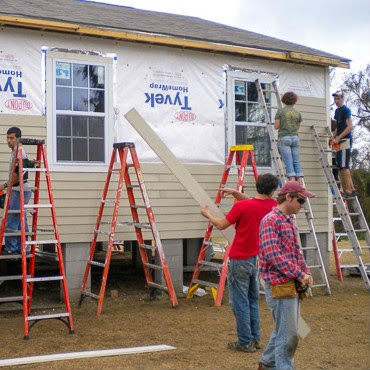
Reflecting the Mennonite church’s commitment to development and disaster relief, Eastern Mennonite University has long offered degrees that prepare students to work in those fields.
As the priorities, needs and philosophies of international service agencies have changed over the years, EMU’s programs have also evolved, with earlier majors in development, nutrition and international agriculture giving way to ones with more emphasis on peacebuilding at both the undergraduate and graduatelevels.
Next academic year, that process of change continues when EMU launches a new humanitarian action leadership (HAL) program. It will include a 21-hour undergraduate minor, an 18-hour graduate certificate and a variety of graduate-level training courses designed for those already working in humanitarian relief.
“The desire has always been to prepare students to engage the very specific needs around the world,” said Ann Hershberger, a professor of nursing and the coordinator of the new program. “Now, leadership training for humanitarian relief workers is where the need is.”
Hershberger, who spent 10 years working in development and humanitarian relief in Central America with two Mennonite voluntary service agencies, helped lead a several-year planning process for the HAL program. If interest is sufficient, the program will expand to a full undergraduate major and a master’s degree.
Next semester, prior to the official beginning of the HAL program, a first undergraduate class offering credit toward the minor will be offered through Canadian Mennonite University. More than 10 EMU students have enrolled and will participate remotely (in real time, with the supervision of an EMU faculty member or graduate student) in the crisis, humanitarian aid and disaster recovery class.
Hershberger said an article in the student newspaper about the new HAL program has already generated interest on campus, and that EMU hopes to build on a disaster management program offered at Hesston College, a two-year Mennonite college in Kansas.
In 2014, a group of faculty began a feasibility study for the HAL program. It determined that significant need exists for a faith-based program that can develop humanitarian assistance leaders with skills in cross-cultural understanding and an ability to collaborate with the many different organizations involved in specific relief projects, Hershberger said.
Daryl Yoder-Bontrager ’80, who helped EMU with the feasibility study, noted that humanitarian relief in the United States (typically referred to as “emergency management”) has become an increasingly professionalized field that needs a well-prepared workforce.
“The Mennonite community has a long history of working with humanitarian response to disasters,” said Yoder-Bontrager, who spent two decades with Mennonite Central Committee’s Latin America programs and is now pursuing a doctorate at the University of Delaware’s Disaster Research Center. “I think EMU can offer a program that will serve domestic needs as well as training students for international work.”
– Story by Andrew Jenner










